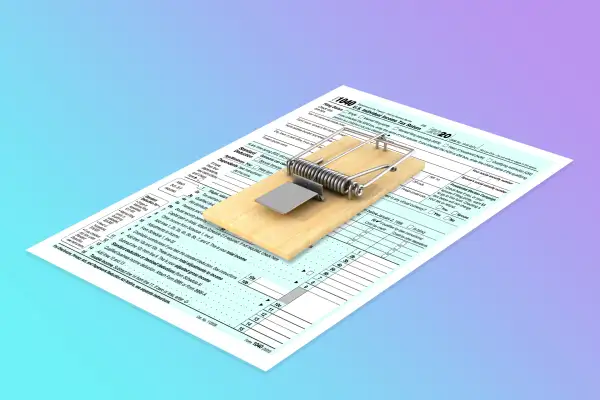A New IRS Tool Lets You Protect Your Tax Refund — and Your Identity — From Scammers

Filing your taxes is stressful enough. The last thing you want to worry about is someone else filing yours before you do.
But with the rise of data breaches and scammers getting more sophisticated by the day, it’s a risk we all need to consider. Reports of identity theft in 2020 hit 1.4 million, the FTC found, more than double the number of reports in 2019. Meanwhile, the IRS identified $2.3 billion in tax fraud schemes in fiscal year 2020.
In an attempt to combat this, the IRS is now allowing taxpayers to set up Identity Protection PINs, codes that can be used to verify someone’s identity before they file. Think of it like the multi-factor authentication you've probably set up for your bank and Gmail accounts: After you pass the verification process, you’ll get a unique, six-digit code online, which you’ll need to present when you file your taxes. The tool was previously available to confirmed identity theft victims only, but this year it's open to everyone.
"This is a way to, in essence, lock your tax account, and the IP PIN serves as the key to opening that account," says IRS Commissioner Chuck Rettig in a news release. "Electronic returns that do not contain the correct IP PIN will be rejected, and paper returns will go through additional scrutiny for fraud."
To sign up for a PIN, use the IRS' Get an IP PIN tool, where, in addition to information like your Social Security number and tax filing status, you’ll need a financial account number linked to your name, like a credit card or student loan account.
It's an extra security step that's more important in 2021 than ever.
Steve Weisman, a Bentley University professor who specializes in white-collar crimes, estimates that identity theft tax scams could be at record highs this year. That’s due to increasing data breaches, but also the fact that so many people are working from home, working on computers that might not be properly secured and more vulnerable to cyberattacks.
The information you use to file your taxes may seem private, but nowadays, it likely isn’t. No matter how careful you are with your personal data now, can you say the same for, say, 10 years ago?
“Even if you’re safe online, you have to assume that the bad actors already have your Social Security number,” says Richard Bird, Chief Customer Information Officer at the cybersecurity firm Ping Identity.
The IRS PINs are an attempt to stem the bleeding of bogus filings, but it’s a far cry away from what people need to be protected from scammers, Bird says. Monitoring your various accounts for any changes and setting strong passwords via web browsers (choosing nonsense passwords that have a bunch of random characters instead of your old standbys) are also important steps to take. And check regularly that all your information on record with the IRS and financial services — like banking, insurance, and investing — is accurate as scammers need to change physical addresses or bank routing numbers to receive tax refunds, Bird adds.
Overall, the best thing you can do to protect yourself is to file your taxes as early as possible, Weisman says. That way, you can be sure you'll get to it before a scammer does.
More from Money:
Tax Scammers Are Getting Sneakier. Here's How to Spot the Latest Cons
7 States That Allow Tax Breaks for Working From Home — And How to Claim Them
